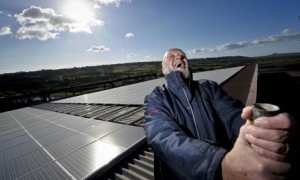"We want to signal very clearly to the market that we consider this to be a big future industry, a big opportunity for agricultural businesses and also a big opportunity for the renewables," said Barclays business product and marketing director, Travers Clarke-Walker, whose team will be managing the fund.
"This is a quickly emerging industry."
A Barclays survey of 300 agricultural customers also showed four out of five farmers recognise renewable energy can save costs and 60% see it as a source of additional income.
The use of renewable energy on farmland has been brought to public attention in Britain by Michael Eavis, farmer and founder of the Glastonbury music festival, who installed more than 1,000 solar panels on his land.
The cost of installing renewable energy projects can be recovered after around 10 years, Clarke-Walker said.
The UK government slashed state support for large-scale solar plants earlier this month as it was concerned a few huge commercial projects would scoop up money intended for household and community projects.
Nevertheless, Clarke-Walker expects around 80-90% of projects will be solar and windfarms as they are cheapest to build and their costs are forecast to drop by up to 50% in the next three to five years as demand rises and technology improves.
Britain aims to generate 15% of energy from renewable sources by 2020, compared with 7.4% reached in 2010.
The fund's loan budget is unlimited and the first £100m could support more than 100 projects as the average cost varies between £250,000-£700,000, Clarke-Walker said.
Suffolk-based farmer Mike Porter, who plants crops such as wheat and oil seed rape, received a £130,000 loan from Barclays to install solar panels on a grain store last month and is expected to make £20,000 per year by exporting power to the National Grid.

